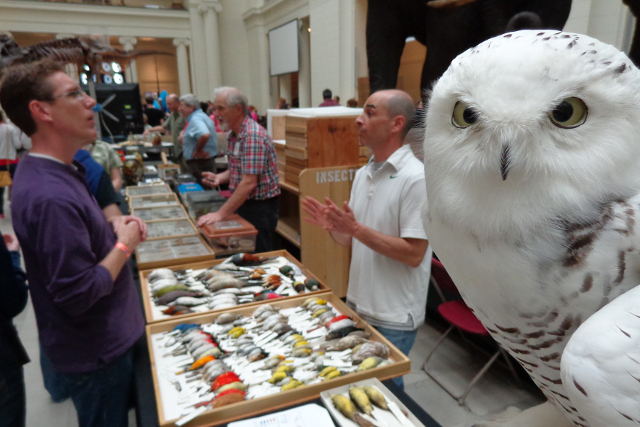Field Research: Introducing 'Ask a Scientist' With The Field Museum
By Marielle Shaw in Arts & Entertainment on Aug 19, 2014 9:00PM
We love our museums. And really, what’s not to love? Whether you’re on the lakefront, Michigan Avenue, or the burgeoning Museum Campus South, we've got some of the finest planetariums, aquariums, galleries, science and history museums out there. World class exhibits are in constant rotation, meaning that even if you think you've seen it all, you probably haven’t.
This is especially true with the Field Museum. Its 480,000 square feet of exhibition space house massive amounts of artifacts and specimens from all over the globe. When we got a chance to go behind the scenes, though, we found out just how much we hadn't seen. The Field Museum is home to over 26 million artifacts and specimens, all carefully catalogued and cared for. But it’s more than crates of ancient vases and pinned butterflies. We met some scientists in several departments and had a blast learning about new technologies and discoveries, heard great stories, and found a shared passion for science that we couldn’t ignore.
So we didn’t. We decided to bring some of the behind-the-scenes to you. Each month, we’ll be bringing you the bio of a scientist currently working at the Field Museum, and help you get to know them with a few questions about themselves, their work, and what’s happening in their department. We’ll show you some of what they love, and then give you the floor. Leave a question for that scientist in the comments. We’ll peruse the questions and choose a few for our scientific friends, and you’ll see their responses to your questions with the next month’s feature. We’re excited to be able to bring you a look behind closed doors and to introduce you to the movers and shakers in the science world here in Chicago, and we hope you’ll enjoy meeting our first scientist, Ben Marks, the Head of Zoological Collections and Birds Collection Manager for the Field Museum.
CHICAGOIST: How long have you been with The Field?
BEN MARKS: I’ve been at The Field Museum for just over two years, but I've had a long history with the bird collection. In the summer of 1995, I had just graduated from college with a serious interest in ecology and natural history. My plan was to move in with my parents for the summer, prepare for and take the GRE exam, and look for seasonal ecological fieldwork starting the following fall. The best decision I ever made was to call the former Bird Collection Manager Dave Willard, to ask if he could use a volunteer that summer. He said to come in. I did, and in a sense, I never left. That phone call led to a volunteer opportunity, which led to a few years of full time work as a collection assistant in the bird collection followed by graduate school and a few years working at Texas A&M University. Now it’s nearly 20 years later and I’m the one answering the phone calls from students looking for volunteer and internship opportunities in the bird collection.
C: What does your job entail?
BEN MARKS: It’s difficult to predict what a day will bring in the bird collection. The simple answer is that I coordinate the daily activities in one of largest and most active bird collections in the world. This entails providing specimens to researchers within the building and around the world for use in their research projects, training future scientists (interns, graduate students) in specimen-based research, and educating the public in the work that is done “behind the scenes” at the Museum. I also get to continue to do research on birds in the tropical rain forests of Africa, and I spend a month or two every year in the field collecting data for those projects.

Photo credit: Photo provided courtesy The Field Museum
C: How did you get into your field of research?
BEN MARKS: I've been interested in nature as long as I can remember. I grew up in rural Indiana and my friends and I spent most of our time exploring the woods, fields, and pastures around my house. My academic interest in natural history and evolutionary biology began when I was an undergraduate at The Evergreen State College. The interest was born in college, nurtured during the time I spent as a collection assistant at the museum in the mid-1990s, and matured throughout my time in graduate school.
C: What's your favorite specimen at The Field?
BEN MARKS: With over half a million bird specimens to choose from you’d think this would be an easy question. It’s not. We have specimens from across the globe, so maybe some of the African rainforest birds that I study would be my favorites. We also have specimens collected by Alfred Russel Wallace (one of the architects of modern evolutionary biology) from his work in SE Asia in the 1850s, and specimens that were picked up in the loop after colliding with a building this morning. Every specimen is unique and is a favorite in its own way. That said, the hundreds of birds on exhibit downstairs in the Hall of Birds are pretty hard to beat. I can still find new things to look at every time I go down there."
C: What are you working on today?
BEN MARKS: This morning I had a thesis committee meeting for a student defending her MS degree at Roosevelt University. Her project involved gathering genetic data for an investigation into patterns of genetic diversity in a species of woodpecker that is broadly distributed across the lowland rainforest in Africa. She did very well.
This afternoon remains to be seen...
Do you have any questions for Ben Marks? Submit your questions in the comments section, and we'll pick 3 for him to answer in two weeks!